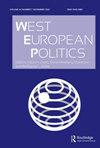当代西欧公众对极右翼的政治容忍
IF 3.6
1区 社会学
Q1 POLITICAL SCIENCE
引用次数: 1
摘要
推动极右翼议程的政治倡议在西欧民主国家获得了重大的政治影响。尽管公众明显普遍反对欧洲的纳粹历史,但这种情况还是发生了。这是一个令人困惑的问题,因为新旧极右翼之间存在相似之处。本文解决了这个难题。从理论上讲,这篇文章区分了拒绝欧洲纳粹历史的广义和狭义解释。从经验上看,它展示了一个完善的调查实验模板如何揭示公众对极右翼政治容忍度的实质性变化。对于五个主要的西欧民主国家的公民来说,拒绝纳粹的过去只意味着拒绝明确被认定为新纳粹的倡议。对于其他极右倡议,政治宽容更为普遍,并且随着这些倡议在政党体系中的制度化而增加。对于在政党体系中充分制度化的极右翼政党,公众的政治容忍度与其他政党处于同一水平。本文章由计算机程序翻译,如有差异,请以英文原文为准。
Public political tolerance of the far right in contemporary Western Europe
Abstract Political initiatives promoting a far-right agenda have gained significant political influence in Western European democracies. This has occurred despite apparent broad-based public rejection of Europe’s Nazi past. This is a puzzle, since there are affinities between the old and the new far right. This article addresses that puzzle. Theoretically, the article distinguishes between broad and narrow interpretations of what it means to reject Europe’s Nazi past. Empirically, it shows how a well-established survey experimental template reveals substantive variations in public political tolerance of the far right. For citizens in five key Western European democracies, rejecting the Nazi past only means rejecting initiatives explicitly identified as neo-Nazi. For other far-right initiatives, political tolerance is more common and increases in accordance with these initiatives’ institutionalisation in the party system. For far-right parties fully institutionalised in the party system, public political tolerance is at the same level as for other political parties.
求助全文
通过发布文献求助,成功后即可免费获取论文全文。
去求助
来源期刊

West European Politics
POLITICAL SCIENCE-
CiteScore
10.00
自引率
7.10%
发文量
58
期刊介绍:
West European Politics (WEP)has established itself as one of the most authoritative journals covering political and social issues in Western Europe. It has a substantial reviews section and coverage of all national elections in Western Europe. Its comprehensive scope, embracing all the major political and social developments in all West European countries, including the European Union, makes it essential reading for both political practitioners and academics.
 求助内容:
求助内容: 应助结果提醒方式:
应助结果提醒方式:


